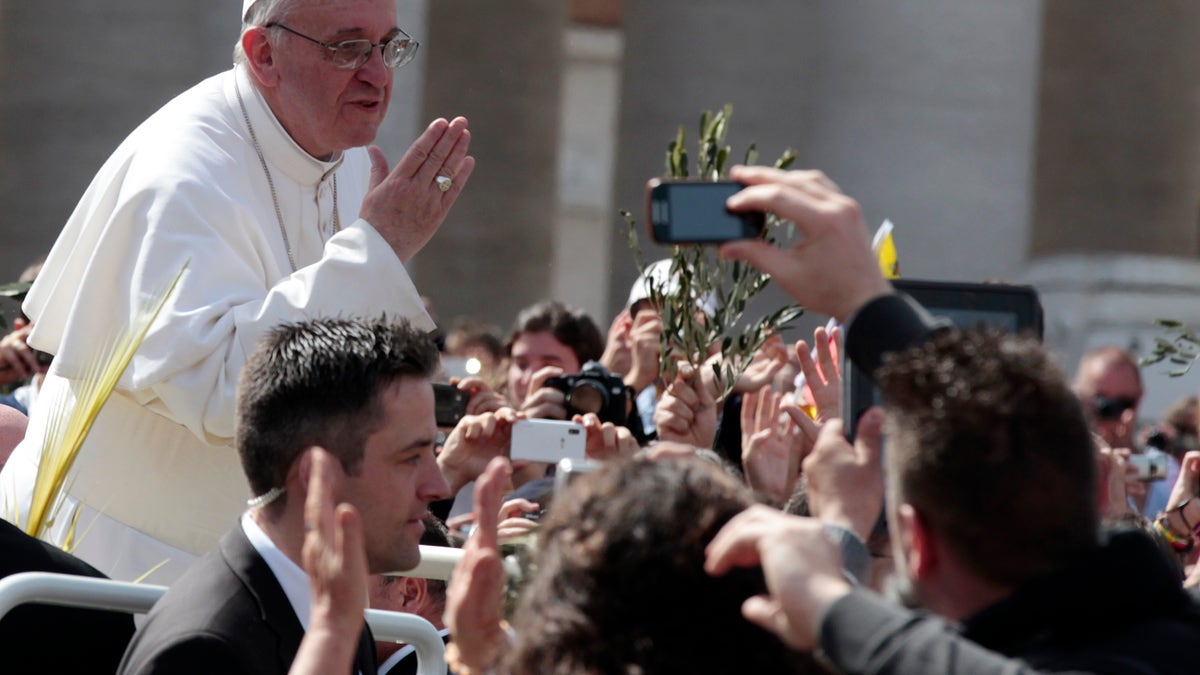
Pope Francis blows a kiss to faithful after celebrating his first Palm Sunday Mass in St. Peter's Square at the Vatican, Sunday, March 24, 2013. (2013 THE ASSOCIATED PRESS)
In recent days, a lively discussion has emerged regarding to what extent the newly elected leader of the Catholic Church is or should be considered a “Latino.” Some claim that as the son of the Italian immigrants, Pope Francis cannot claim to be Latino while others argue that he is, having been born and raised in Argentina and firmly immersed in and shaped by the culture of that beautiful country.
I find the debate both silly and mildly offensive.
Truth be told I’ve always been uncomfortable with the term Latino or even Hispanic for that matter. Why is it that American society is so obsessed with the need to categorize people into ethnic groups?
Anyone who has ever been to Argentina has immediately noted the large number of Italian descendants as well as the decidedly European feel of its capital city Buenos Aires.
The whole thing strikes me as a throwback to the 60s and 70s and the need to differentiate minorities into specific groups so as to better implement affirmative action and promote racial equality. It may have served a purpose back then, but why do we continue to categorize people in the 21st century? Haven’t we evolved since then? How much longer will we continue to allow ourselves to be identified as being this kind of American or that kind of American instead of just being called Americans, pure and simple?
Don’t get me wrong. I am all for showing pride in your cultural background. Diversity is a great thing and bringing together our diverse experiences has been an integral part of the greatness of this country we are blessed to live in. I am immensely proud of my Cuban roots and still hold a strong affinity to my native island country. I am however, an American first and foremost. When asked about my ethnic background, I much prefer to identify myself as Cuban-American rather than as a Latino or Hispanic.
Anyone who has ever traveled or lived in Latin America (a misnomer in and of itself), will tell you that the continent and its people are vastly different. We may share the common influence and bloodlines of Spanish or Portuguese settlers but the histories, culture, food and traditions of our individual countries is very diverse. In some cases, racial mingling with indigenous peoples, as well as climate and geography, have shaped our behavior and our customs.
Pope Francis was born and raised in Argentina, the son of Italian immigrants. Anyone who has ever been to Argentina has immediately noted the large number of Italian descendants as well as the decidedly European feel of its capital city Buenos Aires. Their influence is the result of Argentina’s 1853 Constitution as well as other government policies that encouraged European immigration to settle the sparsely populated country.
Immigration also served to consolidate the power of the ruling elites and diminished the strength of Argentina’s native inhabitants.
Italians were not the only ones who migrated in large numbers to Argentina in the late 19th and early 20th century. Large numbers of Spaniards also arrived as did Germans, Poles, Russians, Slavs, Syrians and others, many of them of Jewish ancestry.
As a result, Argentina has its own distinct personality, history and culture. It is unlike that of Mexicans, Central Americans, Colombians, Venezuelans, Cubans and Puerto Ricans that make up the vast number of Latinos living in the United States.
But do those dissimilarities really make us that different? Does that mean that Argentines ― and Pope Francis ― can’t relate or sympathize with the rest of us branded with the Latino moniker?
I don’t think so. I think our similarities bind us more than our differences. We mostly speak Spanish or Portuguese. The influence of the Catholic Church (good and bad) has played a major role in our common history. Many of our countries have suffered through remarkably similar experiences with oppressive and corrupt leaders and failed policies that have thwarted prosperity and social equality. Too many wars and too much civil strife have hindered the continent and kept it from reaching its full potential. Poverty, discrimination and crime continue to plague many of our countries, especially in urban areas.
Pope Francis comes from a country with more than its share of problems. He has seen up close the inequalities, as well as the positives, that exist in our native lands. He knows the unfulfilled capacity for greatness that lies not just in Latin America but in all of the developing world. In that respect, he is surely a Latino… and African… and Asian too.
I remind people that Pope Francis is the head of the Catholic Church. The word “catholic” has its roots in the Greek phrase καθόλου (katholou), meaning "on the whole, in general." He represents not just the faithful of Latin American origin but rather the universal Church. His principal function is to spread to the world the timeless message of Jesus Christ: that we should strive to love each other, to be humble, and to serve the poor among us. For us Catholics, that is also how we obtain redemption and salvation.
Pope Francis is Latino but he is also much more than that. He is a temporal leader called to preach the eternal truth that the only label that really matters is the one we all share: human.








































